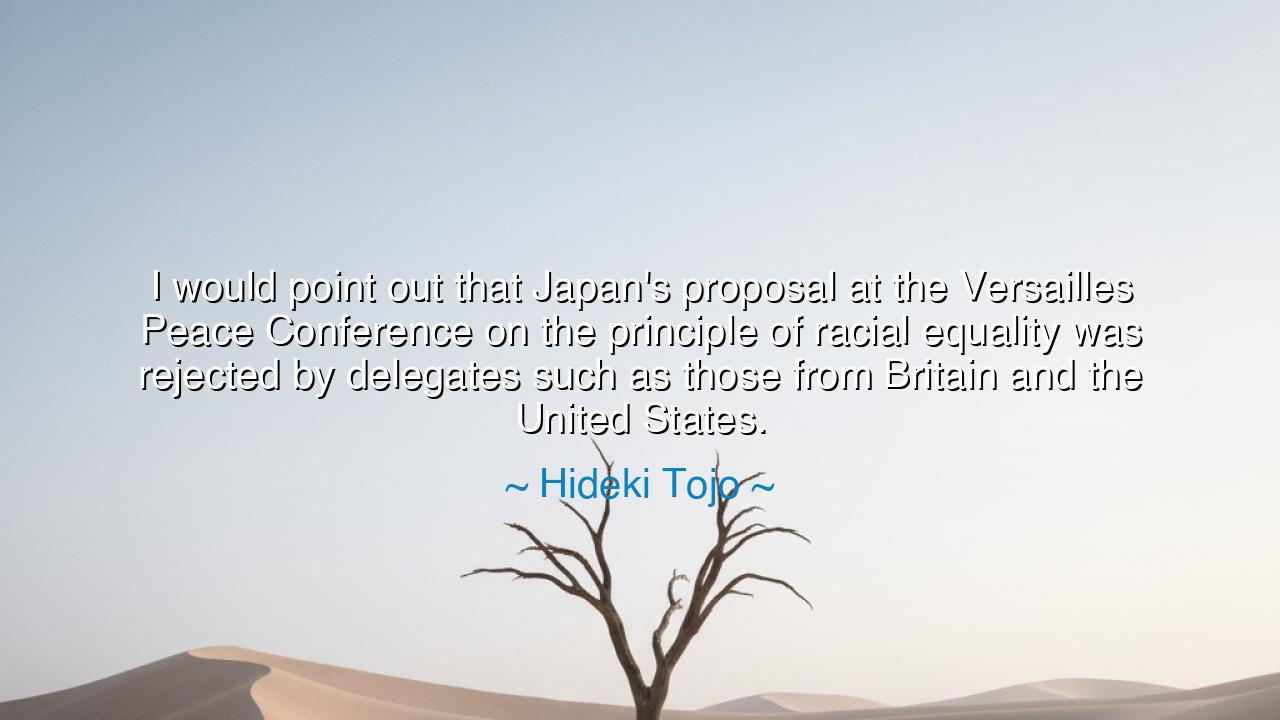
I would point out that Japan's proposal at the Versailles Peace
I would point out that Japan's proposal at the Versailles Peace Conference on the principle of racial equality was rejected by delegates such as those from Britain and the United States.






When Hideki Tojo stated, “I would point out that Japan’s proposal at the Versailles Peace Conference on the principle of racial equality was rejected by delegates such as those from Britain and the United States,” he spoke not merely as a soldier of empire, but as a man wounded by the memory of humiliation and hypocrisy. His words echo with the frustration of a nation that sought recognition among the powerful, only to find that equality — so loudly proclaimed by the victors of war — was not extended to all humanity. In this statement, Tojo invokes a moral grievance, a deep reminder that injustice, when clothed in diplomacy, can seed resentment and alter the course of history.
The origin of this quote reaches back to the Versailles Peace Conference of 1919, when the world gathered to rebuild after the devastation of the First World War. Japan, having fought on the side of the Allies, sought to include in the League of Nations Covenant a clause affirming the principle of racial equality — a proposal meant to enshrine the idea that all nations and peoples, regardless of race, deserved equal respect and dignity. Yet, despite majority support from the delegates, the motion was rejected under pressure from Britain and the United States. For the Western powers, equality remained an ideal for some, not for all. Thus, beneath the triumph of peace lay the seeds of bitterness and disillusionment, especially in Japan, which felt betrayed by the hypocrisy of its supposed allies.
In this light, Tojo’s statement is not only political, but historical and psychological. It reveals the wound carried by Japan’s leaders and intellectuals through the decades that followed — a wound born from being denied equality on the global stage. The rejection at Versailles was more than a diplomatic slight; it was an insult to national pride, a declaration that non-Western nations were to remain subordinate under the pretense of civilization. For Tojo, who later led Japan during the Second World War, this episode became a symbol of Western arrogance — one that, in his eyes, justified Japan’s later quest to assert itself as a power equal among empires.
And yet, if we strip away the context of imperial rivalry and look deeper, Tojo’s words remind us of a universal truth: inequality breeds resentment, and resentment breeds conflict. The ancients knew this well. When one city or people exalts itself over another, claiming virtue while practicing exclusion, it sets in motion the cycle of vengeance that corrodes peace. The rejection of Japan’s plea for racial equality was, in essence, the rejection of the idea that civilization could belong to all. History would show that this failure of moral vision did not merely offend pride — it helped sow the distrust that would later ignite war.
Consider the parallel in the story of Rome and Carthage. Rome, having emerged victorious from the first Punic War, imposed harsh terms upon Carthage and refused to treat its rival as an equal. Carthage rebuilt, proud and wounded, until resentment turned once again to battle — and the world was drowned in fire. So too, in the early 20th century, the Western powers’ refusal to embrace equality at Versailles left a scar that would fester for decades. Tojo’s words, though later spoken in defense of his own empire’s actions, point back to this same tragic pattern: that arrogance masquerading as order leads not to peace, but to ruin.
Tojo’s reflection, therefore, is both a lament and a warning. He invokes the failure of others not to absolve himself, but to reveal a truth that transcends his own era: that peace without justice is fragile, and equality denied becomes the seed of war. His words remind us that moral hypocrisy is as dangerous as open aggression, for it poisons trust and breeds the belief that might, not fairness, rules the world. If equality had truly been embraced at Versailles, perhaps Japan’s path — and indeed, the world’s — might have been different.
Let this be the lesson carried forward: no civilization can claim righteousness while denying the humanity of others. True strength is not found in dominance, but in recognition — the courage to see all peoples as worthy of dignity. Tojo’s quote, read in the light of history, is both a rebuke and a prophecy. It calls upon future generations to build a world where equality is not a token of diplomacy, but the foundation of peace. For when the powerful forget that the weak are their mirrors, they invite not respect, but retribution — and history, like the ancients, will judge them by the justice of their hearts, not the might of their hands.






AAdministratorAdministrator
Welcome, honored guests. Please leave a comment, we will respond soon